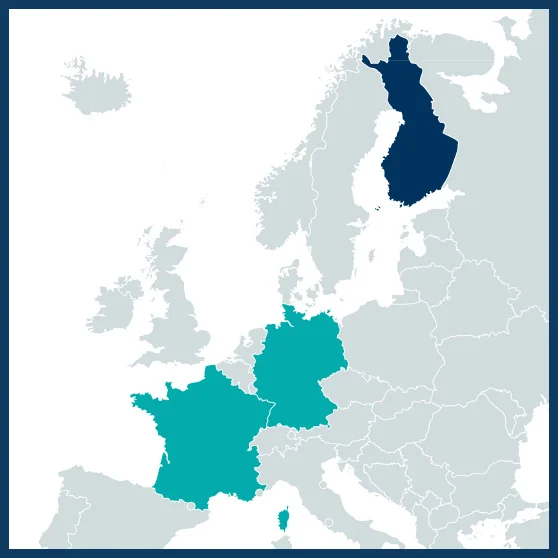01/04/2021 – 31/03/2024
€1,182,860
Mikko Peltoniemi
mikko.peltoniemi@luke.fi
Georges Kunstler
georges.kunstler@inrae.fr
Carola Paul
carola.paul@uni-goettingen.de
Coordinator: Forest Ecology- Natural Resources Institute Finland (LUKE) – Helsinki – Finland
Mountain ecosystems and societies (LESSEM) – INRAE – Saint-Martin-d’Hères – France
Forest Economics and Sustainable Land-use Plannin – University of Goettingen – Göttingen – Germany

Climate change is expected to intensify natural disturbances in forests. The ecological and economic implications of the new disturbance regimes, and the best ways to limit their adverse impacts, need to be better understood. A growing consensus of scientific opinion suggests that increasing the species diversity of ecosystems improves their resilience to disturbance. Making wider use of diversity concepts in forest management could therefore help improve livelihoods, mitigate climate change, and adapt to its consequences. Forest characteristics and management goals vary throughout Europe. Local disturbance regimes are dissimilarly affected by climate change. Hence, the best ways to adapt to the changing disturbances may vary across Europe.
The aim of FUNPOTENTIAL is to develop disturbance-resilient forest management concepts and policies that balance the provision of timber and climate services, and sustain biodiversity in a changing climate.
FUNPOTENTIAL will:
• Quantify the present disturbance regimes for the study regions by analysing the damage risk probabilities and losses due to damage, and factors that improve the forests’ resilience. Future scenarios of potential disturbance pathways will be charted to support resilience and economic analyses.
• Evaluate how functional diversity promotes the forest resilience in boreal, temperate and Mediterranean parts of Europe (Finland, Germany, France), focusing on recovery after disturbances. More risk-resilient management principles, which draw from functional and structural diversity of forests will be developed.
• Study how the tree species and structural diversity influence the profitability of forestry and climate services provided by forests, and how it may promote the resilience of incomes and climate change mitigation under increasing disturbances.
• Examine optimal policies to reduce disturbance risk in forests by promoting species diversity. Examine how the outcomes of policies to promote carbon storage in forests are affected by the changing disturbance regimes.
The results of the project will be disseminated in scientific journals and policy briefs, and presentations in various fora. Bidirectional communication with the forest sector stakeholders in the advisory board and in the organised modelling workshops will provide feedback for the project on relevant and topical policy issues and questions. The results of the project on disturbance vulnerability, resilient management practices and optimal policies will benefit the development of forestry best practice guidelines in three countries, and the development of national and EU level strategies and policies promoting sustainable use of forests.